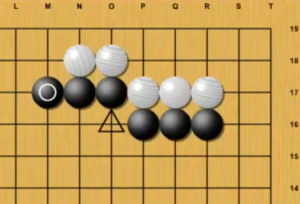This article is based on Jeff’s lecture “3-3 invasion after AlphaGo“.
“Plus value” is something that either directly gives you points, like territory, or can potentially give you points, like influence. “Minus value” is something that can take something away from your pocket, like cutting points, weak shapes and weak groups. If you have them, you can potentially lose something. The opponent has something there.
If you have a cutting point and you have to be alert about it and eventually add a move, that’s a minus value. Or if you have a two-space jump towards the center and the opponent has stones around it, you need to worry about being cut. Or if you have a weak group and the opponent can gain something by attacking it.

If the opponent has a cutting point but the cut doesn’t work you can peep. If he connects you have gained something. You have cashed out that cutting point. But he can resist the peep and say that if you cut there will be a fight. He owes you a little money but refuses to pay. So this is a minor minus value but pro players will fight about it. Pro games are decided by small differences. Amateur games are decided by bigger things.
The evaluation of this position already takes the cutting point’s minus value into account. If Black’s outside is flawless and White only has the corner territory, we can already conclude that this favors Black.
To really cash out is extremely difficult. It happens in AI games but that’s not reason to be so afraid of the 3-3 invasion that you don’t play 4-4 anymore. Put another way, if you don’t know how to use the minus value properly, don’t just imitate AI’s 3-3 invasion or you may end up in a negative position.
So don’t just talk about territory and influence; that’s only half of Go. Don’t miss the minus value. If you want to become a good player, emphasize a lot more on minus value. This is especially true for Western players who have learned that Go is a game that is about making more points than the opponent—they easily emphasize too much on points; they are biased on plus value. They need more balance.
To win a game it’s not enough to just make points. And you cannot neglect either your own or the opponent’s weaknesses. It’s similar to real life: If you work hard 24 hours each day to earn money, will you eventually be rich? Probably not because you neglect your health. One day you will get sick and have to recover for one or two weeks in which you cannot work. So you wasted your time and actually earn less because you neglected your health.
However, the differences mentioned are rather small. They are important for pro players. To us amateurs these variations are all playable. Don’t be afraid to try them out in your games. If eventually you lose the game because of those small differences you should try to challenge a top pro.